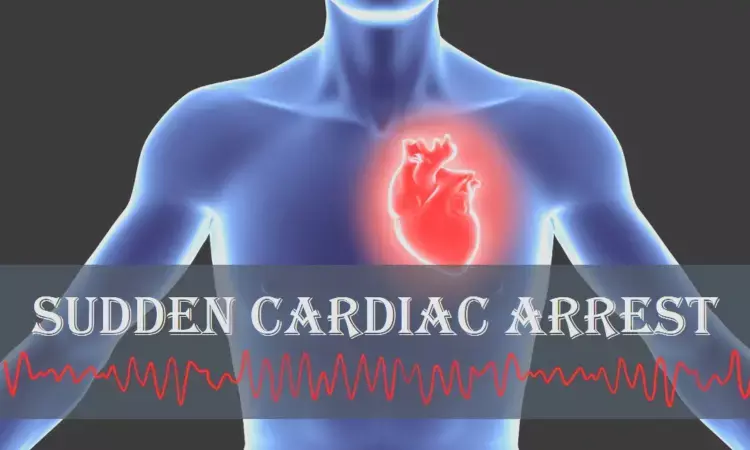- Home
- Medical news & Guidelines
- Anesthesiology
- Cardiology and CTVS
- Critical Care
- Dentistry
- Dermatology
- Diabetes and Endocrinology
- ENT
- Gastroenterology
- Medicine
- Nephrology
- Neurology
- Obstretics-Gynaecology
- Oncology
- Ophthalmology
- Orthopaedics
- Pediatrics-Neonatology
- Psychiatry
- Pulmonology
- Radiology
- Surgery
- Urology
- Laboratory Medicine
- Diet
- Nursing
- Paramedical
- Physiotherapy
- Health news
- Fact Check
- Bone Health Fact Check
- Brain Health Fact Check
- Cancer Related Fact Check
- Child Care Fact Check
- Dental and oral health fact check
- Diabetes and metabolic health fact check
- Diet and Nutrition Fact Check
- Eye and ENT Care Fact Check
- Fitness fact check
- Gut health fact check
- Heart health fact check
- Kidney health fact check
- Medical education fact check
- Men's health fact check
- Respiratory fact check
- Skin and hair care fact check
- Vaccine and Immunization fact check
- Women's health fact check
- AYUSH
- State News
- Andaman and Nicobar Islands
- Andhra Pradesh
- Arunachal Pradesh
- Assam
- Bihar
- Chandigarh
- Chattisgarh
- Dadra and Nagar Haveli
- Daman and Diu
- Delhi
- Goa
- Gujarat
- Haryana
- Himachal Pradesh
- Jammu & Kashmir
- Jharkhand
- Karnataka
- Kerala
- Ladakh
- Lakshadweep
- Madhya Pradesh
- Maharashtra
- Manipur
- Meghalaya
- Mizoram
- Nagaland
- Odisha
- Puducherry
- Punjab
- Rajasthan
- Sikkim
- Tamil Nadu
- Telangana
- Tripura
- Uttar Pradesh
- Uttrakhand
- West Bengal
- Medical Education
- Industry
Long-term increase in fasting blood sugar may raise risk of cardiac arrest in diabetes patients: Study

South Korea: Long-term increase in fasting blood sugar (FBS) in patients with diabetes mellitus (DM) is tied with an increased risk of sudden cardiac arrest (SCA), a recent study published in Cardiovascular Diabetology has shown.
The study's researchers further showed that a long-term decrease in FBS showed no protective effect against the risk of sudden cardiac arrest.
Diabetes is linked with several cardiovascular complications, including sudden cardiac arrest. SCA is a significant healthcare burden, which, if left untreated, can lead to multi-organ failure and death. A previous study has shown that the severity of diabetes mellitus, as evaluated by fasting blood sugar, is associated with SCA risk. However, whether long-term changes in FBS influence SCA risk remains to be seen.
Against the above background, Yun Gi Kim and colleagues from Korea University College of Medicine and Korea University Anam Hospital in South Korea aimed to evaluate the association between long-term change in fasting blood sugar, which can be a surrogate marker for serum glucose control, and the SCA risk in population data from the Republic of Korea nationwide healthcare insurance system.
The research team used sequential nationwide health screening data from 2009 and 2011. Fasting blood sugar was measured at each health screening, and ΔFBS was calculated as FBS (in 2011)–FBS (in 2009).
The study led to the following findings:
· The researchers analyzed 2,801,153 people, and the mean follow-up duration was 6.33 years.
· Compared with the euglycemic group (− 20 ≤ ΔFBS < 20), the 20 ≤ ΔFBS < 40, 40 ≤ ΔFBS < 100, and ΔFBS ≥ 100 groups had increased SCA risks of 25% (adjusted hazard ratio [HR] = 1.25), 66% (adjusted HR = 1.66), and 2.9-fold (adjusted HR = 2.85), respectively.
· The association between ΔFBS and SCA was maintained in people with DM but not those without DM.
· Sex, blood pressure, age, and presence of heart failure did not affect the association between ΔFBS and SCA.
· An overtime decrease in ΔFBS was not tied with reduced SCA risk: the adjusted HR was 1.11 for the ΔFBS < –40 group and 1.12 for the − 40 ≤ ∆FBS < − 20 group.
The study showed that a long-term increase in fasting blood sugar increases the risk of sudden cardiac arrest. "This association was not dependent on confounders and maintained among several subgroups," the researchers wrote. "However, a long-term decrease in FBS was not associated with a reduced SCA risk."
"Whether euglycemia maintenance or FBS reduction can reduce the SCA risk should be tested in future trials," they concluded.
Reference:
Kim, Y.G., Roh, SY., Jeong, J.H. et al. Long-term increase in fasting blood glucose is associated with increased risk of sudden cardiac arrest. Cardiovasc Diabetol 22, 38 (2023). https://doi.org/10.1186/s12933-023-01764-0
Dr Kartikeya Kohli is an Internal Medicine Consultant at Sitaram Bhartia Hospital in Delhi with super speciality training in Nephrology. He has worked with various eminent hospitals like Indraprastha Apollo Hospital, Sir Gangaram Hospital. He holds an MBBS from Kasturba Medical College Manipal, DNB Internal Medicine, Post Graduate Diploma in Clinical Research and Business Development, Fellow DNB Nephrology, MRCP and ECFMG Certification. He has been closely associated with India Medical Association South Delhi Branch and Delhi Medical Association and has been organising continuing medical education programs on their behalf from time to time. Further he has been contributing medical articles for their newsletters as well. He is also associated with electronic media and TV for conduction and presentation of health programs. He has been associated with Medical Dialogues for last 3 years and contributing articles on regular basis.
Dr Kamal Kant Kohli-MBBS, DTCD- a chest specialist with more than 30 years of practice and a flair for writing clinical articles, Dr Kamal Kant Kohli joined Medical Dialogues as a Chief Editor of Medical News. Besides writing articles, as an editor, he proofreads and verifies all the medical content published on Medical Dialogues including those coming from journals, studies,medical conferences,guidelines etc. Email: drkohli@medicaldialogues.in. Contact no. 011-43720751


